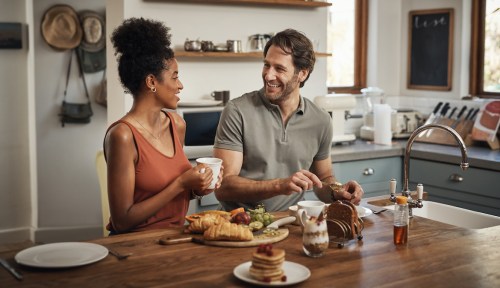Our editors independently select these products. Making a purchase through our links may earn Well+Good a commission
While it’s certainly true that healthy behaviors like eating a nutritious diet and regularly moving your body can boost your longevity, it’s tough to keep up any of these habits if you don’t have a bigger reason “why.” That’s largely why having a life purpose is one of the key commonalities among people in the Blue Zones, areas of the world where folks are known to live well past age 100. As it turns out, that same drive to achieve something bigger than yourself can also work to your advantage in a romantic relationship, particularly when your partner is also motivated by their own lifelong goals.
Experts in This Article
clinical psychologist, life fulfillment expert, and author of Date Smart, Joy From Fear, and Aging Joyfully
Blue Zones expert and author of The Blue Zones Secrets for Longer Living
licensed marriage and family therapist
In practice, that vision doesn’t have to be as grandiose as its connotation might imply. For instance, some folks may feel aligned to worthy-but-lofty goals like curing cancer or ending poverty, but having a life purpose really just requires finding something that you can enjoy doing or pursuing throughout your life. “That might be as simple as, ‘I’m good at parenting or I’m good with kids, and growing a family is everything to me,’ or ‘I love animals, and I want to help reduce their needless suffering,’” says Dan Buettner, founder of the Blue Zones and author of The Blue Zones Challenge.
In a way, having this life purpose functions as “the meta value that encompasses the other eight pillars of the Blue Zones,” Buettner says, “because once you have that purpose, you’re more likely to engage in healthy habits, like getting exercise, eating well, and even taking medication later in life.” All of that feeds into a longer lifespan, as demonstrated by various longitudinal studies that have tracked the mortality of people over time and found that folks with a clear life purpose always tend to outlive their less purposeful peers.
“People who know what they want in life naturally wake up happier and feel more motivated, which can strengthen a relationship.” —Melissa Divaris Thompson, LMFT, relationship therapist
Because of the lifestyle that naturally follows having a purpose in life—that is, engaging in productive, healthy behaviors that serve your goal—this personal mission can also boost the longevity of a relationship. “People who know what they want in life naturally wake up happier, have more balance in their lives, and feel more motivated, all of which can strengthen a relationship,” says relationship therapist Melissa Divaris Thompson, LMFT.
Why having a life purpose can benefit a romantic relationship
A larger life purpose isn’t just fodder for a longer life; it’s also the stuff of rich, meaningful connection in a relationship. Whenever a person lights up while talking about their passion for teaching or cycling or performing is also when their partner can feel closer to their essence as a person—and more willing to share their own life goal(s). “When two people in a relationship each have a deeper purpose, it can bring about more honest, in-depth conversations, which can lead to more trust and intimacy,” says Thompson.
Of course, sharing the same life purpose as a partner or having goals that complement each other could fast-track that connection. “Couples who share a purpose can truly benefit when they join forces,” says clinical psychologist Carla Marie Manly, PhD, author of Date Smart. “For example, two people who are aligned on the ideal of sustainable living will feel more connected to each other as they create a lifestyle that fits that mutual goal. As they work to pursue it together, they’ll feel good about themselves, their relationship, and the fact that they’re living in harmony with their life purpose.”
It’s for that reason that Buettner suggests folks find a way to engage with their purpose outside of work in order to find a compatible partner. For example, that might mean joining a community garden (if gardening is your life passion) or volunteering at an animal shelter (if protecting animals is your thing) so that you naturally run up against like-minded people.
But at the same time, two partners certainly don’t have to share a purpose to be compatible; the more important thing is just that each person has one, says Buettner: “One person’s purpose in life could be to become the top lawyer in their firm, while their partner’s could be to raise good kids, but what’s essential is that each person is supporting the other in achieving their purpose.”
That kind of relationship dynamic tends to work out well for a few reasons. For one, people with purpose are often capable of being better partners, overall, than their purposeless counterparts, given that they’re more likely to feel physically and psychologically well themselves. “These people just wake up every morning without the existential stress of, ‘What am I here for?’” says Buettner. And unburdened by that self-doubt, they’re more capable of lifting up a partner.
Additionally, two partners with unique life purposes will each also have “things going on separate from the relationship,” says Thompson. And these individual interests are just as essential as the shared ones for keeping any relationship balanced and healthy, she says.
Oh hi! You look like someone who loves free workouts, discounts for cutting-edge wellness brands, and exclusive Well+Good content. Sign up for Well+, our online community of wellness insiders, and unlock your rewards instantly.
Sign Up for Our Daily Newsletter
Get all the latest in wellness, trends, food, fitness, beauty, and more delivered right to your inbox.
Got it, you've been added to our email list.











